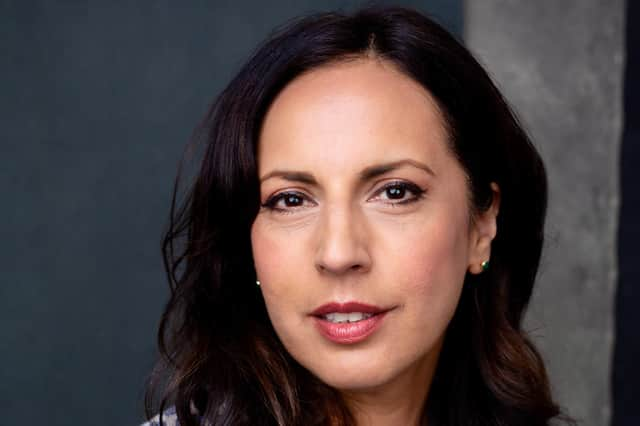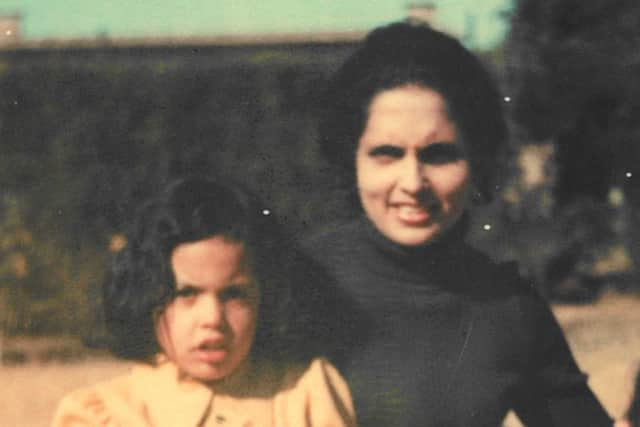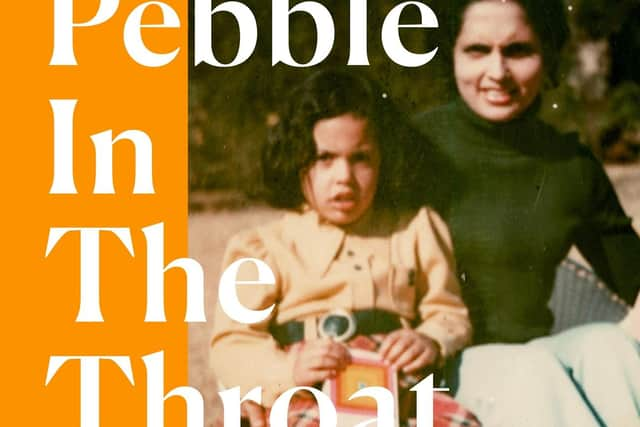How Scottish broadcaster Aasmah Mir found her voice in her book, A Pebble In The Throat


Aasmah Mir talks for a living, co-presenting Times Radio’s breakfast show Monday to Thursday, her confident, upbeat delivery greeting the nation as it wakes.
It’s a skill the award-winning broadcaster has honed on radio at TV since starting out reading the news on STV at 22, through over a decade at Radio 5 Live to co-presenting Saturday Live on BBC Radio 4 with the Reverend Richard Coles from 2014 to 2020 then on Times Radio since its launch, and her way with words also extends to writing a column for the Sunday Times and flourishes in her newly published memoir A Pebble In The Throat.
Advertisement
Hide AdYet there was a time when 51-year-old Mir didn’t speak, falling silent at the age of 12 and whispering through her teens.


“When people said to me ‘oh you’re so confident’ I would always think to myself ‘hmm, I wasn’t always like that’,” she says from the home in London she shares with her seven-year-old daughter.
Born and raised in Glasgow, and of Pakistani heritage, Mir was bullied and then ostracised at school, and retreated into her own world to such an extent that there were years when she rarely spoke outside the home. Now the story of how she found her voice once more comes through loud and clear in her memoir, A Pebble In The Throat: Growing Up Between two Continents, in which she also reveals her family’s fascinating history and lifts the larger than life characters off the page.
Evocative and vivid, Mir’s memoir deftly weaves the stories of her mother and grandmother’s lives into her own so the reader is transported from Glasgow in the 1970s and 1980s to Pakistan in the 1950s and 1960s. We flit from a suburban Glasgow housing scheme where a happy wee Aasmah races around on her bike, all skinned knees and Highland toffee-buckled cheeks in the days before she is made to realise there are people who regard her as different, to her mother’s arrival in Glasgow in the 1960s at 23 and back to Gujranwala, Pakistan where her grandmother lives silent in the shadows of her own home, timid and cowed as she raises her children with her husband and his domineering in situ first wife.
Voices that are stopped as if by a pebble in the throat, are a recurring theme in Mir’s telling of her multi-generational story and reference a tale her mother told her as a child. After toying with other titles - Voices, and ‘Nae Hands’ (as instructed by a boy in country dancing practice at school but ‘wouldn’t translate very well, even around the UK never mind anywhere else’) - she chose it as her title.


“It’s to do with a story my mum used to tell me when I was a kid and came back to me with the book as I was thinking about losing your voice and not having a voice like my grandmother. I thought there’s something to do with voices and tongues and it can just mean different things to different people which I liked.”
Advertisement
Hide AdAfter leaving school and Glasgow to study law in Bristol and forging a career in broadcasting in London, Mir had put her teenage experiences of racism behind her but writing the book saw her revisit the memories.
“I had to read something out at the Aye Write book festival in Glasgow and felt my voice really quivering and thought ‘for goodness sake, pull yourself together!’ Quite a lot of my family were in the front row, maybe that was it,” she laughs. “There’s something about reading out loud that is very affecting, difficult. The words are out there and you can’t hide away from them.”
Advertisement
Hide AdThe book is also full of lightness and humour, however, particularly as Mir recounts her childhood. There’s her larger-than-life dad, who worked all hours managing petrol stations and whose arrival to pick her up from school with his music booming made her cringe, and her capable, courageous mother, the descriptions of whose cooking make the reader drool.


“I always wanted to write a kind of linear memoir and then I was talking to my mum and saying you never really understood what it was like for us because you had a very secure upbringing, were head girl and educated in Pakistan with people who looked like you, and she said ‘well actually my childhood wasn’t that stable’ and she started telling me about it. And I was like ‘What? What do you mean there was a stepmother in the house and what do you mean your mum was married before, and all this stuff. I knew that her sister had died, but I didn’t know the full detail or of how my mother was sent away as a six year old to be tutored and it was horrific. And such an interesting story.”
So the idea of writing concurrent timelines of her mother and grandmother’s coming of age, along with hers, was born.
Mir talks about the many daily instances of racism she experienced but for her the worst was when her little brother, who has Asperger’s, was targeted.
“I hated that because he was so innocent and didn’t know what was going on. He couldn’t react when you were having a normal conversation with him so when these little kids were calling him horrible names I remember thinking that’s beyond cruel. I spent a lot of my time punching boys generally because they were so mean.


“Obviously children do that, it’s not really their fault, but they do pick on weakness and it was all about if you were different in any way. And I’m not innocent, I got involved in that as well when people forgot and left me alone, so I’m not saying I’m perfect. But I remember whenever they went near my brother thinking that’s a step too far.”
Advertisement
Hide AdWhat would Mir say now to another child who was being ignored or bullied or experiencing racism?
“Don’t keep it to yourself, tell someone. If you can’t tell your mum or dad for any reason, because you don’t think they would take it seriously or you don’t have a good relationship with them, you have to tell someone, some adult, some trusted family friend, someone, because keeping it in is really difficult.”
Advertisement
Hide Ad“Back then it was really hard because there were no black or brown people on TV, but at least now there are cultural reference points. You think ‘hang on a minute, I’m not going to put up with that, and people who look like me are also visible so I’m not going to be shut up’. I don’t know… my daughter hasn’t experienced it yet. I even had to explain to her what the word racism was, and just explaining it was ridiculous, because it is ridiculous. She just said to me ‘that sounds stupid’, and what can you say, it is stupid.
“In its purest form - because obviously people will dispute what is racism and whether something is racist or not - but racism in its purest form, discriminating against someone because of their race, the colour of their skin, is mad. I mean it’s always been mad and it remains mad.”
In the book Mir recounts an incident which she acknowledges that while painful, also contributed to making her who she is today. At the age 12 she crosses the school bully and as punishment he stops anyone from speaking to her for months. With her mother visiting family in Pakistan and her dad busy with his job and running a household of four children, Mir turned in on herself, wishing herself invisible and barely speaking. Exiled by silence, her own voice is silenced too.
“Yeah, well, there was no-one to talk to,” she says. “Luckily at home there was Helen (a local woman, “an angel”, who looked after the children as babies when her mother trained as a teacher and stayed on) and my dad tried his best, but he was a 50-year old bloke in the 80s with four kids and a wife thousands of miles away so he couldn’t do much. It was very lonely, a real, visceral loneliness, but I think a lot of children go through that.
“But it made me eventually not at all fearful or bothered by being on my own. So I suppose in a way that’s a good thing because it means you’re not a people pleaser or constantly looking for people to hitch your wagon to. So maybe it works out OK in the end, even though it felt painful at the time.”
When her mother returned to Glasgow for six months Mir made sure when she left again for Pakistan that she went too.
Advertisement
Hide Ad“At school in Pakistan I just enjoyed being around people who looked like me. I could relax. They thought I was a bit strange because I had a funny accent and didn’t wear the clothes and couldn’t speak the language, but they all spoke English anyway. They were just nice, you know? It was just being able to totally relax and not feel you stood out, because there were all types of girls there, all different shades of brown, and it was just nice not waiting for that moment that would come almost every day where somebody would say something that would remind you that you were not the same as everybody else.”
Returning to Glasgow and a new school Mir had a fresh start and found friends as her teenage years went on, including Felicity of whom Mir says ‘girls like that who saved you are absolute diamonds’, then went on to study law at Bristol University.
Advertisement
Hide Ad“Just being chucked into a city that I’d never heard of really helped and I was able to talk to strangers. And then starting a job, everything felt like just starting again and I really loved that idea of just being able to put everything behind me. No-one knew what had happened so I was able to assert myself as a fairly normal person, and I did. I think the fear had kind of gone by then.”
Mir’s career took off and her early experiences gave her the courage to speak up even if she felt like a lone voice challenging the perceived narrative, coupled with a steely determination when things were rocky.
“When I was going through the breakdown of my marriage, which was very sudden, it felt like being on a boat, listing, and I remember thinking I need to keep everything upright. I was also trying to do a job that involved physically being in a studio and couldn’t do that because I had to look after my daughter so I ended up working from home and broadcasting from a computer on an ironing board during the pandemic.
“I remember thinking this is awful but it’s not as bad as the stuff that happened when I was 13 or 14, because as an adult you have some control; something happens to you but it’s up to you how you react to it and how you decide what’s next.”
Nowadays Mir makes things work for her and her daughter, who she refers to in her book as ‘unexpected’, as well as ‘tickly behind the knees’.
“Yes, I was 43. I never really wanted to have children, or get married; I wasn’t really into any of that stuff. Then I got married and was very much in love with my partner at the time… we got married mainly I think because our parents wanted us to, that was 2007, and I had her two years later.
Advertisement
Hide Ad“I’d thought I wasn’t really into it and then when I was 42 quite a few friends and relatives the same age had children and I suddenly felt like the last woman standing and had this nagging voice in my head of do you not want to at least experience all of this, pregnancy and motherhood and see what it is? So that’s why at the age of 43 I found myself having a baby and at the age of 51 I find myself with a seven year old which is weird, because all my daughter’s friends’ mothers and fathers are much younger.
“But I’ve never cared what people think. My experience from childhood taught me that you have no control over people’s minds so why worry about it.”
Advertisement
Hide AdLooking back while writing her memoir, Mir could see her own timeline and there are two periods that stick out as her happiest.
“One is when I was at primary school and just loved it, being alive, being loud and playing and falling over and being bruised and bloodied all the time and always out, constantly, and it was that era when you could just knock on people’s door and people would come out and you could go and explore the burn and the woods for a whole day. That was a fantastic time.
“And I think the next time I was really happy was in my twenties in Glasgow and I was just going out a lot and discovering a real social life and that was amazing. Our chaos days, when we used to all go clubbing and have a great time. Those were definitely my happiest times. I think life since then has been quite tricky.”
On a tight schedule that sees her rising at 3am to make it to the studio, working a shift, collecting her daughter then being in bed by half past eight and falling asleep reading a book (she’s a big fan of writers like Gabriel García Márquez, Isabel Allende and Hanif Kureishi), time for writing was limited to two to three hours a day. Also, it’s a lonely business, but Mir knows about that, and is a grafter and determined, proud that she’s realised an ambition.
“I’ve always wanted to write, more than anything else, more than being a radio presenter or doing TV, and always felt you’re not as good as other people so just park that, but luckily I’ve done it now.”
And she doesn’t say never when I ask her if she’ll ever do it again.
Advertisement
Hide Ad“I’ve no plans to. Once you’ve done it once, I suppose you can do it again,” she muses. “I would absolutely love to… but I’m not sure how easy it would be to do it a second time around… I’ve got a little idea in my head, but it would be fiction, which is a whole different kettle of fish, and to be honest I’m a bit scared… ” she trails off, possibly a little dry in the throat. But we know how she deals with that, and whatever she does next, Mir is a woman who has already found her voice.
A Pebble In The Throat by Aasmah Mir – published by Headline, hardback, £20. Also available on Audible, www.audible.co.uk.
aasmahmir.com